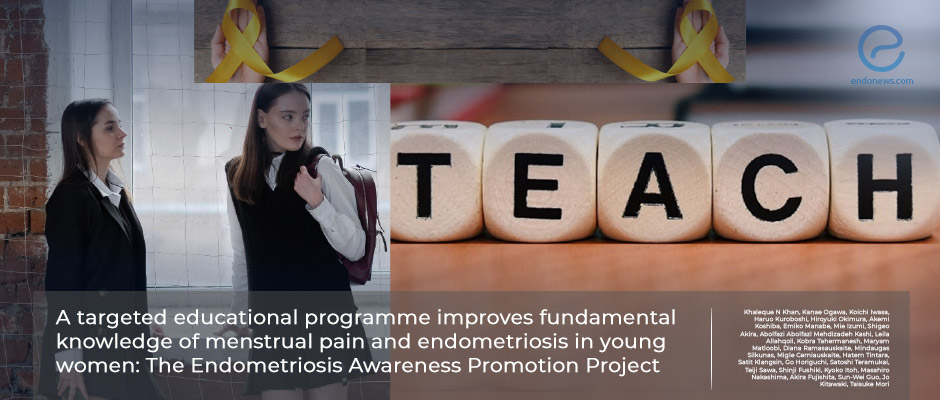Educational Programs Important to Raise Endometriosis Awareness
Nov 17, 2022
A targeted educational program can improve knowledge about period pain and endometriosis among college, nursing, and medical students.
Key Points
Highlights:
- A well-prepared educational program can motivate students to seek medical attention for the early detection of endometriosis.
Importance:
- This finding underscores the importance of education programs to raise awareness about endometriosis and ensure delays in diagnosis and management are minimized.
What's done here:
- Researchers conducted a multinational cross-sectional study to assess the effect of an educational program consisting of lectures and group discussions in prompting students to visit a gynecologist.
- A total of 1,911 young women from Japan, Lithuania, Iran, and Thailand took part in the study (271 were college students, 877 were medical students, and 763 were nursing students).
Key results:
- Following the educational program, the knowledge of the students and the consequences of period pain and endometriosis was improved.
- The program prompted nursing and medical students, but not college students to visit a gynecologist.
Limitation
- The number of students responding to the questionnaire was small and they all came from high-income families so the results may not be representative of all students.
- Schoolchildren were not included in the study and the demographic profiles of all students were not recorded.
- Some of the questions in the questionnaire could have been of a “leading” nature.
- The number of centers included in the survey was limited and did not reflect the effect of the educational program in remote areas and students from low or middle-income families.
Lay Summary
An educational program consisting of lectures and group discussions motivated nursing and medical students to seek medical attention so endometriosis can be detected and managed early, reported a new study published in the scientific journal Reproductive Biomedicine Online. However, this was not the case for college students.
“An educational program can improve awareness and knowledge of endometriosis and dysmenorrhoea among young women,” the authors of the study concluded. (Dysmenorrhoea is the painful period associated with endometriosis and a cardinal symptom of the disease).
Endometriosis remains a poorly understood disease both by the general public and doctors alike. This means that it often goes undiagnosed or misdiagnosed causing women to experience unnecessary pain and suffering. Raising awareness about the disease is therefore paramount to ensure women seek medical help in a timely manner.
In order to assess whether a properly designed educational program offered to young women could increase their awareness about period pain and endometriosis and prompt them to seek medical advice if they have any symptoms associated with the disease, a team of researchers led by Dr. Taisuke Mori from the Department of Obstetrics and Gynecology, Graduate School of Medical Science, the Kyoto Prefectural University of Medicine in Japan conducted a multinational cross-sectional study between 2017 and 2019.
The researchers first used a pen-and-paper questionnaire to assess the knowledge of young women, ages 19 to 24 about period pain and endometriosis. They then used a separate questionnaire to assess any improvements in knowledge 1 and 3 months after an educational program consisting of lectures and/or group discussions about the topic.
A total of 1,911 young women from Japan, Lithuania, Iran, and Thailand took part in the study. Of these, 271 were college students, 877 were medical students, and 763 were nursing students.
The results showed that knowledge about period pain and endometriosis was lowest among college students. The knowledge of nursing students was modest, while that of medical students was fair.
Among college students, 15.5% reported experiencing cyclical pain themselves, even when they took painkillers. This ratio was 4.6% among nursing students and 3.8% among medical students. Most of the students managed this pain by “enduring it” or using over-the-counter painkillers.
Following the educational program, the knowledge of the students and the consequences of period pain and endometriosis were improved. However, the program did not prompt college students to visit gynecologists. It did, however, interest nursing and medical students to do so.
“In conclusion, this study suggests that an informative educational programme involving group lectures improves knowledge of menstrual pain, its consequences, and endometriosis among young women,” the researchers concluded.
Research Source: https://pubmed.ncbi.nlm.nih.gov/36241496/
awareness diagnosis management questionnaire dysmenorrhea misdiagnosis college young women

